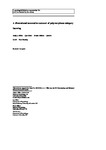A dimensional summation account of polymorphous category learning
| dc.contributor.author | Wills, Andy | |
| dc.contributor.author | Ellett, L | |
| dc.contributor.author | Milton, F | |
| dc.contributor.author | Croft, G | |
| dc.contributor.author | Beesley, T | |
| dc.date.accessioned | 2020-01-06T09:57:12Z | |
| dc.date.issued | 2020-03 | |
| dc.identifier.issn | 1543-4494 | |
| dc.identifier.issn | 1543-4508 | |
| dc.identifier.uri | http://hdl.handle.net/10026.1/15281 | |
| dc.description.abstract |
Polymorphous concepts are hard to learn, and this is perhaps surprising because they, like many natural concepts, have an overall similarity structure. However, the dimensional summation hypothesis (Milton and Wills Journal of Experimental Psychology: Learning, Memory and Cognition, 30, 407-415 2004) predicts this difficulty. It also makes a number of other predictions about polymorphous concept formation, which are tested here. In Experiment 4, we confirm the theory's prediction that polymorphous concept formation should be facilitated by deterministic pretraining on the constituent features of the stimulus. This facilitation is relative to an equivalent amount of training on the polymorphous concept itself. In further experiments, we compare the predictions of the dimensional summation hypothesis with a more general strategic account (Experiment 2), a seriality of training account (Experiment 3), a stimulus decomposition account (also Experiment 3), and an error-based account (Experiment 4). The dimensional summation hypothesis provides the best account of these data. In Experiment 5, a further prediction is confirmed-the single feature pretraining effect is eliminated by a concurrent counting task. The current experiments suggest the hypothesis that natural concepts might be acquired by the deliberate serial summation of evidence. This idea has testable implications for classroom learning. | |
| dc.format.extent | 66-83 | |
| dc.format.medium | ||
| dc.language | en | |
| dc.language.iso | en | |
| dc.publisher | Springer (part of Springer Nature) | |
| dc.rights | Attribution-ShareAlike 4.0 International | |
| dc.rights | Attribution-ShareAlike 4.0 International | |
| dc.rights | Attribution-ShareAlike 4.0 International | |
| dc.rights | Attribution-ShareAlike 4.0 International | |
| dc.rights | Attribution-ShareAlike 4.0 International | |
| dc.rights | Attribution-ShareAlike 4.0 International | |
| dc.rights | Attribution-ShareAlike 4.0 International | |
| dc.rights | Attribution-ShareAlike 4.0 International | |
| dc.rights | Attribution-ShareAlike 4.0 International | |
| dc.rights.uri | http://creativecommons.org/licenses/by-sa/4.0/ | |
| dc.rights.uri | http://creativecommons.org/licenses/by-sa/4.0/ | |
| dc.rights.uri | http://creativecommons.org/licenses/by-sa/4.0/ | |
| dc.rights.uri | http://creativecommons.org/licenses/by-sa/4.0/ | |
| dc.rights.uri | http://creativecommons.org/licenses/by-sa/4.0/ | |
| dc.rights.uri | http://creativecommons.org/licenses/by-sa/4.0/ | |
| dc.rights.uri | http://creativecommons.org/licenses/by-sa/4.0/ | |
| dc.rights.uri | http://creativecommons.org/licenses/by-sa/4.0/ | |
| dc.rights.uri | http://creativecommons.org/licenses/by-sa/4.0/ | |
| dc.subject | Categorization | |
| dc.subject | Overall similarity | |
| dc.subject | Family resemblance | |
| dc.subject | Dual-process theory | |
| dc.title | A dimensional summation account of polymorphous category learning | |
| dc.type | journal-article | |
| dc.type | Journal Article | |
| dc.type | Research Support, Non-U.S. Gov't | |
| plymouth.author-url | https://www.webofscience.com/api/gateway?GWVersion=2&SrcApp=PARTNER_APP&SrcAuth=LinksAMR&KeyUT=WOS:000520711400010&DestLinkType=FullRecord&DestApp=ALL_WOS&UsrCustomerID=11bb513d99f797142bcfeffcc58ea008 | |
| plymouth.issue | 1 | |
| plymouth.volume | 48 | |
| plymouth.publication-status | Published | |
| plymouth.journal | Learning and Behavior | |
| dc.identifier.doi | 10.3758/s13420-020-00409-6 | |
| plymouth.organisational-group | /Plymouth | |
| plymouth.organisational-group | /Plymouth/Admin Group - REF | |
| plymouth.organisational-group | /Plymouth/Admin Group - REF/REF Admin Group - FoH | |
| plymouth.organisational-group | /Plymouth/Faculty of Health | |
| plymouth.organisational-group | /Plymouth/Faculty of Health/School of Psychology | |
| plymouth.organisational-group | /Plymouth/REF 2021 Researchers by UoA | |
| plymouth.organisational-group | /Plymouth/REF 2021 Researchers by UoA/UoA04 Psychology, Psychiatry and Neuroscience | |
| plymouth.organisational-group | /Plymouth/Research Groups | |
| plymouth.organisational-group | /Plymouth/Research Groups/Institute of Health and Community | |
| plymouth.organisational-group | /Plymouth/Users by role | |
| plymouth.organisational-group | /Plymouth/Users by role/Academics | |
| dc.publisher.place | United States | |
| dcterms.dateAccepted | 2019-12-23 | |
| dc.rights.embargodate | 2021-3-13 | |
| dc.identifier.eissn | 1543-4508 | |
| dc.rights.embargoperiod | Not known | |
| rioxxterms.versionofrecord | 10.3758/s13420-020-00409-6 | |
| rioxxterms.licenseref.uri | http://creativecommons.org/licenses/by-sa/4.0/ | |
| rioxxterms.type | Journal Article/Review |



